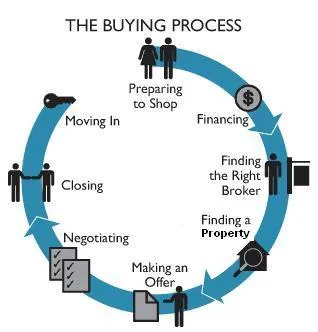DECIDING TO BUY
Purchasing a property is most likely the biggest financial decision you will ever make. Whether this is your first purchase or you are an experienced buyer, this decision must be made carefully.
Why do you
Want to Buy?
Are you tired of paying rent? Have you decided to pay your own mortgage and not your landlord’s? Have you outgrown your current home? Are you looking for an investment portfolio? Are you looking for a rental property? Would you like a larger yard? Would you rather live in a different area? Do you want to shorten your commute? Having a clear sense of your reasons for buying will help you choose the right property.
HAS YOUR INCOME GROWN?
Property ownership is an excellent investment; whether you are looking for your dream home, a rental property, or to expand your investment portfolio. Owning real estate is one of the least risky ways to build equity or to obtain a greater return on your initial investment.

Ground work to buying
CREATE YOUR FINANCIAL FILE
This file will contain all of your important financial documents that you will need to secure financing for your property. This file should contain:
-Financial statements
-Bank accounts
-Investments
-Credit cards
-Auto loans
-Recent pay stubs
-Tax returns for two years
-Copies of leases for investment properties
-401K statements, life insurance, stocks, bonds, and mutual account information
CHECK YOUR CREDIT RATING
Your credit score will have a huge impact on what type of property you can buy, and at what price. It is first recommended to check your credit rating with an experienced lending institution so that we can determine what you can afford. The lender will research your credit ratings from the three credit reporting agencies Equifax, Experian and Trans Union. We will be happy to recommend experienced, knowledgeable lenders in the residential, construction, and commercial and investment real estate fields.
BEING CAUTIOUS WITH YOUR FINANCES
Now is NOT a good time to make sudden career changes or large purchases. You want to approach your property purchase from a position of financial stability.
Expertise & Knowledge
The Right Real Estate Agent
Buying a property requires making many important financial decisions, understanding complex issues, and completing a lot of paperwork. It helps to have an expert in your corner when undertaking such a large purchase. We can guide you through this process, and also provide you with access to property listings before they hit the general market.
CHOOSING YOUR REAL ESTATE PROFESSIONAL:
Look for a full-time agent – one who has experience completing transactions similar to yours.
Interview a few agents: Are they familiar with the area in which you are interested?
Ask how much time the agent will have for you and if they are available at night and on weekends.
Ask about their credentials and education: A good agent will continually strive to improve and gain knowledge of the latest real estate trends.
Does the agent return your calls promptly? Time is money when attempting to buy a property.
Ask them about their past experiences and transactions.
Choose an agent who listens attentively to your needs and concerns. Pick an agent, with whom you feel comfortable.

Time to start shopping
Go FOR A drive
Explore the neighborhoods, complexes, or subdivisions that interest you. Take a drive around to experience what it might be like to own a property there. Begin familiarizing yourself with the types of properties available in those areas.
Refine your search
Choose a few properties that interest you the most and have your REALTOR® schedule viewings. Inquire with your agent about the potential long-term resale value of the properties you're considering
offer and negotiations
Now you've found a house that you like and are ready to submit an offer between yourself and the seller. An offer is a binding contract which usually includes an option period for you to obtain an inspection and, if needed, third party advice from contractors. When submitting an offer you'll also need to provide the option money and earnest money to secure your offer.
Is the listed price the right price? A REALTOR® can provide you with a Comparative Market Analysis (CMA) of the home’s value. Once the home inspection comes back, you might ask the sellers to lower the price or repair the items that need to be fixed prior to closing.
Be mindful that if a buyer is relying on lender financing, the property will have to be appraised. If there’s any shortfall between the purchase price and appraised value, that gap will have to be made up somehow, or the deal could fall apart.
Your REALTOR® will help guide you through this process. Remember, the best transactions are a win-win for all parties.
under contract
You're under contract! Now what? After signing the contract, there’s usually a period of six to eight weeks before the closing is final. During that time, you’ll have a few things to take care of to ensure that everything goes smoothly. In fact, this in-between time can be busier than most people expect! Plan for the following:
The Option Period & Money: Under normal circumstances, the option period is anywhere from 7 to 10 days. The option period money is nonrefundable money in the form of a personal check that goes to the seller. This money must be delivered to the seller during the first three days of the contract. If selected in the sales contract, the option period money will go towards your closing costs at closing.
The Earnest Fee Money: Generally, the earnest fee money is 1% of the sales price that is delivered to the title company in the form of a personal check. This money is refundable up until the end of the option period. The earnest money is refundable at certain points after the option period has expired but it is not an easy task to achieve. Therefore you should be confident moving forward that you are going to purchase the home. The earnest money is kept at title at an escrow officer of that title company. At closing the earnest money is credited towards your closing costs.
The Inspection: The inspection occurs during the option period by a licensed inspector. During the inspection, you will receive a detailed report about your potential homes replacement and repair needs. The inspection should also give you piece of mind about your purchase.
Negotiating Repairs: After inspection is done, the seller and buyer negotiate repairs of the home. This is done in two ways, 1) the repairs are done by the seller before closing and the seller furnishes receipts as proof of the repair OR 2) the seller gives the buyer closing costs in lieu of repairs. This way you will do the repairs or replacements after closing.
The Home Insurance & the Home Warranty: It is important that during the option period you start researching home owner’s insurance policies as well as home warranty programs. Home owner’s insurance is required if you are obtaining a loan on the property. In general, home warranty programs cover certain items during the first year of home ownership. Both should be selected a couple days after the option period has expired.
The HOA Documents: The Home Owner’s Association Documents are delivered during the option period or escrow period. The purpose of the documents is to give you information about the rules and regulations of the HOA you are purchasing a home in. The documents will also give you an idea of the HOA’s budget, operating fees, and various other expenses.
The Title Commitment: The title commitment is delivered by the title company during the escrow period. This document will give you information on the current home owner as well as if there are liens on the property.
The Appraisal: Lenders require that homes have an appraisal to ensure that the value of the home meets their requirements. The appraisal is ordered by the lender after they confirm that you are qualified to purchase a home. The home must appraisal for the sales price listed on the sales contract. If the property does not appraise the buyer and seller will negotiate the sales price.
inspection
Some believe home inspections are a waste of money and time, but they're actually essential steps in the buying process. The cost of a home inspection may seem unnecessary, but it's well worth it, considering buyers could save thousands of dollars by avoiding costly repairs to their new home. In addition, home inspectors will tell you about problems you might miss during a walk-through, including problems with wiring, whether or not there has been water damage, and more!
The home inspection usually takes place right after a seller accepts an offer from a buyer. After both parties sign the purchase agreement, the home goes into escrow. The buyer will select a home inspection company and schedule the visit as soon as possible. A home inspection typically happens before or during the same time as the home appraisal.
The length of home inspections can vary, but on average, a thorough inspection from a reputable inspector lasts about three or four hours. Your REALTOR® will coordinate with the buyer's REALTOR® on scheduling of the inspection. It's a good idea to schedule an inspection as soon as possible after signing a purchase contract, so it doesn't hinder the sale. The home inspection will cover all major systems, from the roof to the foundation. The inspector will also check for potential safety hazards, such as lead paint and asbestos. Potential buyers should plan to be present during the inspection to ask questions, point out concerns, talk with the inspector, and get a better understanding of the condition of their new home.
Final stages
MOVING IN
Closing
You have made it to the table and you are almost there; but there are some final things to do or think of before the party:
Final inspection:
Generally considered a formality, the final inspection is conducted either the day before or on the day of closing. During this visit, you will verify that the property is in proper working order, confirm that its condition is consistent with your previous viewing, ensure no items have been left behind, and confirm that all items included in the purchase are present.
closing day:
Closing is the day when the seller receives the check, and the buyer receives the deed to the property as well as the keys to their new home.
The Closing Disclosure is completed 3 business days before closing. Once closing instructions are received, documents are drawn up for closing. Even though the loan approval is received, these details must be finalized before the closing can take place.
The closing will take approximately one hour. You will be asked to sign a number of official documents. The closing will take place at the title company office. It is best that you make outside arrangements for small children, so that you will have no distractions at the closing.
Please bring your funds in the form of a cashier's check made payable to the Title Company or wire funds from your bank in advance. Many documents that you will be signing will need to be notarized, therefore you need to bring a VALID driver's license.
Once both parties have signed, you will receive a phone call from the title company stating that funding has taken place which means you are officially a home owner.

Properties
Work With Me
I'm passionate about real estate and I strive to share that enthusiasm with my clients. With my extensive experience, I’ll help you achieve your goals for your home, family, and long-term investment growth.

